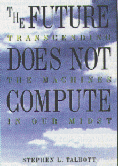

 |
 |

I got about two thirds of the way through The Future Does Not Compute before giving up on it. It wasn't its anti-technological stance which turned me off, but rather the way Talbott went about presenting his ideas. All too often he lapses into complete mysticism, with such outbreaks as
The solitary bird, gripped by an unknowing intensity as it ploughs through the trackless ether, hears, on the dull edges of its consciousness, a call of destiny sung by hidden choirs.
(which is defended by a counter-attack on a ridiculous straw-man reductionism). Even where he avoids outright obscurantism, Talbott lacks any kind of respect for philosophical niceties. He keeps on attributing intentionality to machines, for example, in such fashion as
the computer ups the ante in a game already extremely perilous. It relentlessly, single-mindedly, apes us even in those habits..., for it is endowed in some sense with a mind of its own.
and talks about them ``acting in their own right'', but at the same time refuses to allow that there is any sense in which they can approach human beings. For all he goes on about the ``mechanical'' being present in our ``inner selves'', Talbott's rhetoric relies heavily on a rigid and fundamental dichotomy between the natural and the artificial, between man and machine. He makes no attempt at all to justify this assumption: even the references to Searle and Penrose I kept expecting never turned up.
Talbott has an eye for an effective phrase and an impressive vocabulary (sometimes he verges on poetry), but this is taken to extremes: he is always prepared to sacrifice clarity and content on the altar of rhetoric and effect. Terms like ``human nature'' and ``consciousness'' and phrases such as ``our trust as stewards of the Earth'' and ``sleepwalking subservience to technology'' are used without any explanation in critical contexts. Here are some longer examples:
We must tame technology by rising above it and reclaiming what is not mechanical in ourselves.
Where, as a child, I differentiated myself from the animal, now I must learn to differentiate myself from the machine---and this differentiation lies in the deepening of consciousness. It is therefore not only a matter of pointing to established human nature; it is also a matter of realizing human nature in its movement toward the future. Related problems are that Talbott presents his ideas in a rambling and disconnected fashion, in short sections within short chapters, and that he has a tendency to say the same thing over and over again in different ways.
The Future Does Not Compute also lacks any kind of sociological or psychological depth. The discussion of globalization, for example, doesn't engage at all with historical or economic perspectives on the subject, and analysis of at least one concrete example (of a network group which claims ``community'' status) might have given some basis to his analysis of the relationship between technology and community; as it is, all he can offer on these subjects are empty generalizations.
The most distressing thing about The Future Does Not Compute is that I actually agree with quite a lot of what Talbott has to say, both on general subjects like education and the evils of assuming there are technological solutions to all human problems and on more specific ones such as profit-seeking business ethics and naively optimistic claims by artificial intelligence researchers. I fear, however, that many people will use his book as another excuse to reject all discussion of some important questions as obscurantist nonsense. In the end I abandoned The Future Does Not Compute because I wasn't learning anything from it: it is emotionally stirring but intellectually vacuous.
Disclaimer: I requested and received a review copy of The Future Does Not Compute from O'Reilly & Associates, but I have no stake, financial or otherwise, in its success.
All book reviews by Danny Yee are available via anonymous FTP ftp.anatomy.su.oz.au in /danny/book-reviews (index INDEX) or URL http://www.anatomy.su.oz.au/danny/book-reviews/index.html Copyright © Danny Yee 1995. He can be reached via e-mail at danny@cs.su.oz.au. Comments and criticism welcome.